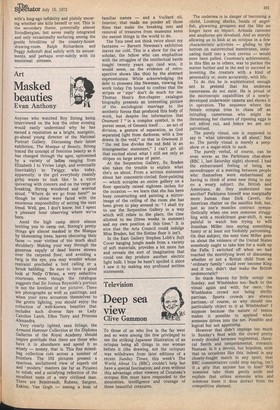Television
Deep sea view
Clive Gammon
To those of us who live in the far west and so were among the few privileged to see the striking Japanese illustration of an octopus being all things to one woman before it (the drawing, not the octopus) was withdrawn from later editions of a recent Sunday Times, this week's The World About Us (BBC) couldn't help but have a special fascination; and even without this advantage other viewers of Cousteau's octopus film must have responded to the sinuosities, intelligence and courage of these beautiful creatures. The undersea is in danger of becoming a cliché, Looming sharks, bands of angel fish, glowering groupers and the like no longer have an impact. Armada cannons and amphorae are devalued. And so merely allowing us to look at an octopus in a few characteristic activities — gliding to the bottom on outstretched membranes, insin uating itself into a rock crevice — would soon have palled. Cousteau's achievement, in this film as in others, was to pursue the matter further and in the end to succeed in investing the creature with a kind of personality or, more accurately, with life.
To do this he is• sophisticated enough not to pretend that his undersea cameramen do not exist. He is proud of the microscopic capabilities of a newly developed underwater camera and shows it in operation. The sequence where the female octopus tries to chase off an intruding cameraman who might be threatening her clusters of ripening eggs is not edited out, and ,hence we are not patronised.
The purely visual, one is supposed to say is 'what television is all about.' Not so. The purely visual is merely a peepshow or a sugar-stick to suck.
The purely verbal, of course, can be even worse as the Parkinson chat-show (BBC 1, last Saturday night) showed. I had the embarrassed feeling of being an eavesdropper at a meeting between people who themselves were embarrassed at having to think of some new thing to say on a weary subject: the British and Americans, do they understand one another? Parkinson himself was marginally more human than Dick Cavett, the American chatter on the satellite link, but, just as one's muscles contract sympathetically when one sees someone strugg ling with a recalcitrant gear-shift, it was painful to watch him trying to will Jonathan Miller into saying something funny or at least not foolishly patronising.
On that subject, the next time Miller goes on about the violence of the United States somebody ought to take him for a walk up the Falls% I switched off when we had reached the mortifying level of discussing whether or not a British child from an 'ordinary family' could ever become King and if not, didn't that make the British undemocratic?
So thank heaven for little octopi on Sunday, and Wimbledon too., Back to the visual again and with, for once, the Wimbledon crowd not being shrilly partisan. Sports crowds are always partisan,of course, so why should one particularly object to it at Wimbledon? I suppose because the nature of tennis makes it possible to applaud when someone drives into the net. Possible and logical but not appetising. However that didn't impinge too much in Sunday's final with the crowd pretty evenly divided between regimental, classi cal Smith and temperamental, romantic Nastase. Is it a devout, but hopeless, wish that on occasions like this, indeed in any closely-fought match in any sport, that BBC commentators could stop saying, isn't it .a pity that anyone has to lose? Will someone take them gently aside and explain that unless someone wins and someone loses it does detract from the competitive element.










































 Previous page
Previous page